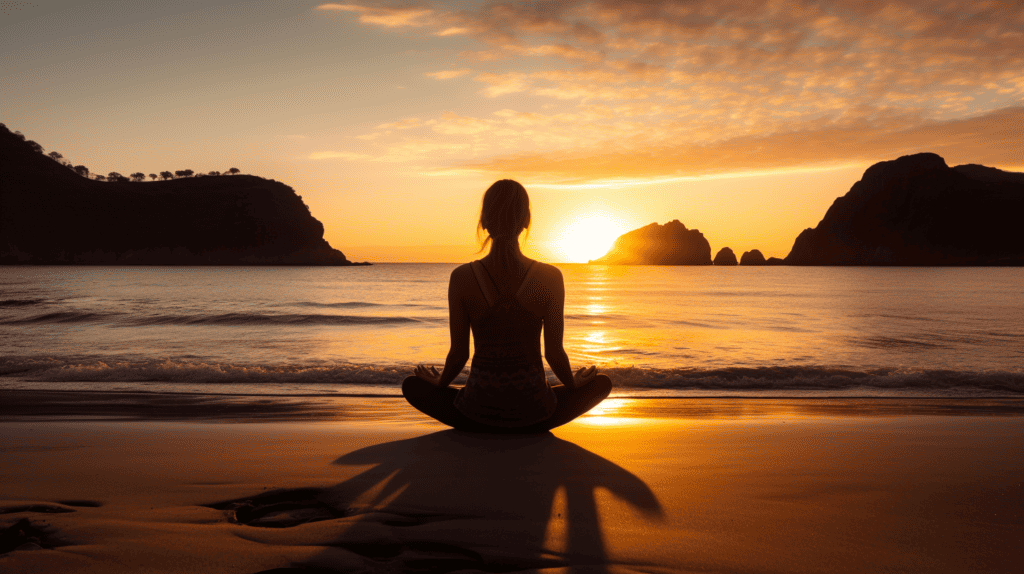Welcome to the complete beginner guide to meditation practices, a time-honored practice that unfurls pathways to serenity, mindfulness, and holistic wellness! If you’re fresh on this scene and curious about all the excitement or wondering how to embark on this calming voyage – rest assured, you’re in good hands.
Did you know regular meditation has been linked with reducing stress levels? Now, let’s plunge into this enlightening endeavor together! Believe me when I say this expedition is bound to be transfiguring beyond what words can express.
Key Takeaways
- Meditation is a practice that allows us to empty the mind and cultivate inner peace and awareness. It offers numerous benefits for our physical, mental, and emotional well-being.
- There are various styles of meditation for beginners to explore, such as mindfulness meditation, transcendental meditation, loving-kindness meditation, and more. Each style has unique benefits.
- Setting a daily meditation routine is essential for beginners to establish consistency. Starting small with just a few minutes of meditation each day and gradually increasing the duration can help ease into the practice.
- Breathing meditations and mindfulness meditations are two popular techniques for beginners. Breathing meditations involve focusing on your breath as an anchor of attention, while mindfulness meditations focus on being present in the moment without judgment. Both techniques offer calming benefits.
Understanding Meditation: What It Is and What It Does
Meditation is a practice that allows us to quiet the mind and cultivate a deep sense of inner peace and awareness. By taking the time to sit or engage in other meditative practices, we can experience numerous benefits for our physical, mental, and emotional well-being.
According to The Chopra Center, “Meditation is a pathway to connect with your inner wisdom.”.
Incorporating basic meditation into our daily routine can help reduce stress levels, enhance concentration and focus, improve sleep quality, promote emotional stability, boost creativity, and increase self-awareness.
With regular practice, meditation can transform our lives by helping us develop greater clarity of thought and find a sense of calm amidst life’s challenges.
There are various styles of meditation available for beginners to explore. Some popular forms include mindfulness meditation, focused attention meditation (such as breath or mantra meditation), transcendental meditation (TM), loving-kindness or compassion meditation, and body scan meditation techniques.
Regardless of which type resonates with
Benefits of Regular Meditation Practice

Meditating every day can make your life better. Here are some ways how:
- You feel less stressed. Meditation helps you find peace and calm in your day.
- Your brain health gets better. You can think more clearly and keep your mind focused.
- It boosts your mood. You feel happier and more at peace with yourself.
- You live in the moment. This means you enjoy every bit of your day without thinking about the past or future.
- Your memory improves. With a calm mind, you can remember things much more quickly.
- It curbs those racing thoughts in your head, letting you focus on what truly matters.
- It helps manage mental health issues like anxiety and depression.
Styles of Meditation
Meditation practices can be vast and varied, with each style offering its unique benefits. Here is an overview of some common styles in a comprehensive table:
| Form of Meditation | Description | Benefits |
|---|---|---|
| Mindfulness Meditation | This style involves focusing on the present moment and accepting it without judgment. It often includes attention to the breath and allows thoughts to come and go without resistance. | It helps reduce stress and anxiety, enhances self-awareness, and helps manage symptoms of depression. |
| Transcendental Meditation | This involves silently repeating a personalized mantra in a specific way. It’s a more spiritual approach to meditation and is often practiced twice daily. | It enhances spiritual growth, reduces stress and anxiety, and improves cardiovascular health. |
| Progressive Relaxation | Also called body scan meditation, this involves slowly tensing and then relaxing each muscle group. It aims to promote physical relaxation and mental calmness. | It helps in relaxation, reduces chronic pain, and improves sleep quality. |
| Loving-Kindness Meditation | This practice involves directing well-wishes and love toward oneself and others. It encourages an attitude of kindness and acceptance. | It improves empathy, compassion, and self-confidence and promotes positive interpersonal relationships. |
| Zen Meditation | This is part of Buddhist practice and involves specific steps and postures. It requires more discipline and practice compared to other forms. | It offers spiritual growth, enhances self-awareness, and promotes a sense of peace. |
These are just a few of the meditation styles, but they give an idea of the range of practices available. It’s all about finding a style that resonates with you and supports your spiritual journey.
Getting Started: Setting a Daily Meditation Routine

Setting a daily meditation routine is essential for beginners to establish consistency and make meditation a regular practice in their lives. Making time for meditation every day is crucial, even if it’s just for a few minutes.
It’s helpful to use reminders, such as setting an alarm or placing a sticky note on your mirror, to stay consistent with your practice.
Starting small and building up gradually is also essential when establishing a daily routine. Begin with just five minutes of meditation each day and gradually increase the duration as you become more comfortable.
This approach allows you to ease into the practice without feeling overwhelmed.
Choosing a specific time and place for your meditation sessions can enhance the effectiveness of your practice. Find a quiet and peaceful space where you won’t be easily distracted.
Some people prefer meditating early in the morning or before bed, while others find midday or lunch breaks more suitable. Experiment with different times until you find what works best for you.
Remember that setting aside time for yourself and prioritizing self-care through meditation
Making Time for Meditation Every Day
I make time for my meditation every day. It helps me feel calm and keeps stress away. I started with only five minutes a day. Then, I slowly added more time as I got used to it. Now, meditation is part of my daily routine, just like eating or brushing my teeth.
You can do this too! Find a quiet place in your home where you won’t be disturbed. Start by sitting still for 10 minutes daily using a timer to help track your time. Once you start doing it regularly, it will become easy and natural – another part of your busy day that brings peace and joy.
Using Reminders to Stay Consistent
Setting reminders can be a helpful tool in staying consistent with your meditation practice. By using reminders, such as setting an alarm or placing sticky notes around your living space, you can ensure that you remember to meditate each day.
Consistency is vital in meditation, so finding ways to remind yourself and make it a habit is essential. Whether it’s in the morning, during lunch break, or before bed, having regular reminders will help you stay committed to your meditation practice and experience its many benefits for your mental health.
So go ahead and set those reminders to keep yourself on track with your daily meditation routine!
Starting Small and Building Up
When starting your meditation practice, you must begin small and gradually increase your sessions over time. By starting with shorter meditation sessions, such as just a few minutes daily, you can ease yourself into the practice and allow your mind to adjust.
As you become more comfortable, you can gradually add more time to each session, increasing it by a minute or two every week or so.
Building up your meditation routine this way allows you to develop consistency and avoid feeling overwhelmed. Remember that even short periods of meditation can have significant benefits for your mental well-being.
Choosing a Time and Place
It’s essential to choose a specific time and place for your meditation practice. Find the time in your daily routine to dedicate a few minutes to yourself without interruptions.
This could be in the morning before starting your day or in the evening before going to bed. Create a designated meditation space that is calm, quiet, and free from distractions. It could be a corner of your bedroom or living room where you can sit comfortably.
By having a consistent schedule and peaceful environment, you can create the right atmosphere for deepening your meditation practice.
Meditation Techniques for Beginners
In this section, we will explore various meditation techniques that are perfect for beginners. From simple breathing meditations to guided visualizations, there is something for everyone.
Whether you’re new to meditation or looking to expand your practice, these techniques will help you find peace and clarity. Dive into the world of meditation and unlock its many benefits by exploring these beginner-friendly techniques.
[Additional Instruction]: Please remember to include an anchor text link to a reputable website when using a quote from another source.
Breathing Meditations
When it comes to meditation, one technique that is often recommended for beginners is breathing meditation. This involves focusing on your breath and using it as an anchor for your attention.
By simply paying attention to the sensation of each inhale and exhale, you can bring a sense of calm and relaxation to your mind and body. Deep breathing is a natural function that we all do, so it’s a good starting point for those new to meditation.
Research has shown that practicing breathing meditations regularly can reduce anxiety, treat symptoms of depression, and contribute to a greater sense of well-being. Just 10 minutes of breath meditation each day can make a difference in reducing stress in your life.
So why not give it a try? Find a quiet place where you won’t be disturbed, sit comfortably with your back straight, close your eyes or keep them slightly open if preferred, and focus on the sensation of your breath moving in and out.
Mindfulness Meditations
Mindfulness meditation is a type of meditation that focuses on your thoughts without judging them. It’s about being aware and present in the moment, paying attention to your thoughts and feelings without getting caught up in them.
By practicing mindfulness meditation, you can improve your mental and emotional well-being. It can help reduce stress, anxiety, and negative emotions. Mindfulness meditation teaches you to stay present and aware of your thoughts without judgment, which can lead to a greater sense of well-being.
It’s a beneficial practice for beginners who want to cultivate more peace and clarity in their lives.
If you’re looking for a way to quiet your mind and find inner calmness, give mindfulness meditation a try. Take some time each day to sit quietly, focus on your breath or body sensations, and observe your thoughts with kindness and curiosity.
Focus Meditations
Focus meditations are an essential part of a meditation practice. They help improve concentration and bring clarity to the mind. During focus meditations, you focus on a single point or object, such as your breath or a specific sensation in your body.
By doing this, you train your mind to stay focused and avoid distractions.
One technique for focus meditation is using the breath as an anchor. You observe each inhale and exhale, bringing your attention back whenever it wanders. Another technique is focusing on a specific body part, like the sensation of your feet touching the ground.
By practicing focus meditations regularly, you can develop better focus and concentration not only during meditation but also in other areas of your life. This can have a positive impact on tasks that require mental clarity and productivity.

Mindful Walking Meditations
Walking meditation is a great way to combine movement and mindfulness. It’s a beginner-friendly technique where you walk in a relaxed and focused manner, being fully present in the moment.
Research shows mindful movement practices like walking meditation can improve attention span and overall well-being. By practicing mindful walking, you can develop mindfulness, enhance concentration, reduce stress and anxiety, and improve your mental and physical health.
There are different styles of walking meditation, including traditional Buddhist practices, yoga-based movements, and modern mindfulness approaches. So why not take a stroll outside and experience the benefits of mindful walking meditation for yourself?
Progressive Muscle Relaxation
Progressive Muscle Relaxation (PMR) is a technique that can help you relax and reduce stress. It’s great for beginners who are just starting their meditation journey. With PMR, you tense and then relax different muscles in your body, which helps release tension.
Deep breathing is an integral part of this technique as it promotes relaxation. By practicing PMR, you can melt away the stress and anxiety that build up in your muscles. It’s a powerful tool that can bring peace and calmness to your mind and body.
So try it and see how it can benefit you on your spiritual path!
Mantra Meditation
Mantra meditation is a powerful technique that involves repeating phrases or mantras to help focus and calm the mind. It’s a simple practice that can be used by beginners without any prior experience.
When you repeat these sacred words or sounds, it helps to keep distracting thoughts at bay and bring your attention back to the present moment.
The benefits of mantra meditation are numerous. It can improve your ability to concentrate, reduce stress levels, and promote overall mental, emotional, and physical well-being. By focusing on a mantra during meditation, you create a positive intention or affirmation for yourself, which can have a profound impact on your mindset and attitude towards life.
If you’re new to mantra meditation, choose a word or phrase that resonates with you. It could be something like “peace,” “love,” or “I am enough.” Sit in a comfortable position, close your eyes, and begin repeating the chosen mantra silently or out loud.
Allow yourself to fully immerse in its meaning as you continue with each repetition.
Guided Meditations
Guided meditations are a great option, especially if you’re new to meditation. It’s a technique where someone leads you through the practice, helping you imagine calming places or situations in your mind.
Guided meditation can be beneficial for reducing stress and improving focus. Some examples of guided meditation techniques include body scan and mindfulness exercises. In this article, I provide free resources that you can use to learn how to meditate and try it out for yourself.
Here are some additional resources on meditation exercises:
The Transcendental Meditation Technique
I want to introduce you to the Transcendental Meditation technique. It’s a simple and natural meditating method with many health benefits. This technique doesn’t require concentration or control of your thoughts so anyone can practice it.
All you need is a mantra, which can be a word or sound that helps guide your meditation. The Transcendental Meditation technique is widely used and has been found to lower blood pressure and reduce stress.
If you’re looking for an easy and effective way to meditate, give Transcendental Meditation a try!
Dealing with Common Challenges
When it comes to meditation, beginners often face common challenges that can hinder their practice. From physical discomfort to difficulty concentrating, these obstacles can make it tempting to give up.
But fear not! In this section, we’ll explore some of these challenges and offer tips on how to overcome them so you can continue your meditation journey with confidence. Let’s dive in and learn how to navigate the meditator tips below.
Physical Discomfort
Physical discomfort can sometimes be a challenge when starting meditation. It’s common to experience pain or discomfort in the body as you sit and focus your attention. However, it’s important not to let this discourage you from continuing your practice.
Several techniques can help alleviate physical discomfort, such as adjusting your posture, using cushions for support, or incorporating gentle stretching exercises before and after your meditation session.
Remember that everyone’s body is different, so it may take trial and error to find what works best for you. But with patience and persistence, you can overcome physical discomfort and fully enjoy the benefits of meditation.
Restlessness or Boredom
Restlessness or boredom can sometimes arise during meditation, but it’s important not to let these challenges discourage you. I know it can be frustrating when your mind feels restless, or you become bored, and your mind will wander, but it’s actually quite common.
The key is approaching these feelings with kindness and curiosity rather than judgment. Instead of trying to push away restlessness or force yourself to stay focused, observe these sensations without attaching any meaning to them.
Allow them to come and go like passing clouds in the sky. Remember that meditation is a journey, and just like anything else worthwhile in life, it takes time and patience to cultivate a regular practice.

Difficulty Concentrating
One common difficulty beginners may face when starting their meditation journey is difficulty concentrating. It can be challenging to quiet the mind and focus on the present moment, especially if you’re new to meditation.
However, some techniques can help improve concentration during formal meditation. One helpful technique is to bring your attention back to your breath whenever you notice your mind wandering.
Another technique is to practice mindfulness, which involves non-judgmentally observing your thoughts and feelings without getting caught up in them. By incorporating these techniques into your practice, you can calm your mind and improve concentration over time.
Self-Judgment
Self-judgment is something that many beginners struggle with when starting their meditation practice. It’s common to feel restless, bored, or like you’re not doing it right. However, it’s important to remember that meditation is a personal journey, and there is no “right” way to do it.
Instead of judging yourself, try guided meditations, as they provide gentle instruction and a focal point to help you stay focused. These can be especially helpful for beginners who may struggle to quiet their thoughts or let go of self-judgment.
By letting go of judgment and embracing a beginner’s mindset, you can create a space for growth and exploration in your meditation practice. According to Mindful.org, “Guided meditations are particularly useful if self-judgment or doubt makes sitting silently with your mind a challenge.” Source: https://www.mindful.org/free-guided-meditations.
Incorporating Visualization into Your Practice
Visualization can be a powerful tool to enhance your meditation practice. It involves using your imagination to create vivid mental images to help calm the mind and deepen your focus.
By incorporating visualization techniques into your meditation routine, you can tap into the power of imagery and bring about positive changes in your mental state.
Simple Visualization Techniques
Visualization meditation is a powerful practice that can help to calm the mind, reduce stress, and improve overall well-being. Here are some simple visualization techniques you can try:
- Color Breathing: Imagine breathing in a calming color, such as blue or green, and exhaling any tension or negativity. Visualize the color, filling your body with tranquility and relaxation.
- Compassion Meditation: Picture someone you care about deeply and send them thoughts of love, kindness, and compassion. Visualize their happiness and well-being as you cultivate feelings of warmth and care towards them.
- Progressive Muscle Relaxation: Starting from your toes and moving up to your head, visualize each muscle group in your body relaxing and releasing tension. Imagine a wave of relaxation flowing through each part of your body as you let go of any tightness or stress.
- Guided Imagery: Use recorded guided meditations or scripts to take yourself on a visual journey to a peaceful place, such as a beach or forest. Imagine every detail of this serene environment and allow yourself to immerse in its beauty and tranquility fully.
Recommended Visualization for Stress and Anxiety

One effective visualization technique for reducing stress and anxiety is to imagine yourself in a peaceful and serene environment. Close your eyes, take deep breaths, and visualize a place where you feel calm and relaxed.
It could be a beach with gentle waves, a quiet forest with tall trees, or a cozy room filled with soft candlelight. Imagine the sights, sounds, and smells of this place, allowing yourself to immerse in the experience fully.
Feel the tension leave your body as you focus on the tranquility of this visualization. This practice can help alleviate stress and create a sense of inner peace during challenging times.
Recommended Visualization for Depression
Visualization can be a helpful technique for managing depression. When feeling down, try closing your eyes and imagining a peaceful scene that brings you comfort and joy. Picture yourself in this serene environment, surrounded by nature or engaging in activities that make you happy.
As you visualize this favorable scenario, focus on the details – notice the colors, sounds, and sensations around you. Allow yourself to fully immerse in this mental image and embrace the feelings of relaxation and contentment it brings.
Visualization meditation has been shown to reduce symptoms of depression and promote emotional well-being by fostering nonjudgmental awareness and helping individuals cope with stress.
Recommended Visualization for Anger Management
Visualization meditation can be a powerful tool for managing anger and frustration. By using the power of imagery, this technique helps calm the mind and bring about relaxation. One recommended visualization for anger management involves picturing a serene and peaceful scene, like a beautiful beach or a tranquil garden.
As you close your eyes and imagine yourself in this peaceful place, focus on deep breathing techniques and let go of any tension or negative emotions you may be holding onto. Visualize yourself releasing that anger with each exhale, allowing it to dissolve.
This visualization can help promote inner peace and reduce feelings of anger, helping you manage your emotions more effectively. Remember that visualization meditation is just one tool among many for managing anger – it’s essential to find what works best for you!
Free Resources for Beginners
As a beginner, it’s essential to have access to helpful resources that can support your meditation practice. Fortunately, there are many free resources available online that can guide you on your journey.
From downloadable mindfulness exercises and guided meditation scripts to meditation apps, these resources provide valuable tools and meditation instructions. By utilizing these free resources, you can deepen your understanding of different meditation techniques and enhance the benefits of your practice.
Whether you’re looking to reduce stress, improve focus, or cultivate a sense of inner peace, these resources can be incredibly beneficial in supporting your meditation practice as a beginner.
Downloadable Mindfulness Exercises
If you’re starting your meditation journey, downloadable mindfulness exercises can be a helpful resource. These exercises are designed to guide you through the practice of mindfulness and help you reduce stress.
You can find these exercises on various platforms, such as Tara Brach, which offers common meditations for beginners. By downloading these exercises, you’ll have convenient access to tools that will assist you in learning how to practice mindfulness effectively.
Incorporating downloadable mindfulness exercises into your routine can support your well-being and help you enjoy life more fully through meditation.
Guided Meditation Scripts
Guided meditation scripts are helpful tools for beginners to learn to meditate. These scripts provide instructions on how to sit comfortably, focus on the breath, scan part of the body, and use guided imagery.
They can be used to calm the mind, relax the body, and promote healing. Free guided meditation scripts are available online in different durations, such as 5-minute or 20-minute sessions.
You can also find scripts in PDF format for easy access. These resources are great for teaching mindfulness and exploring various meditation techniques. Whether you prefer short meditations or longer ones, there is a script out there that will suit your needs.
Meditation Apps
As a beginner on your meditation journey, using meditation apps can be incredibly helpful. One popular app, Headspace, is considered the best by experts. It has an easy-to-use interface and offers hundreds of guided meditations to choose from.
The great thing about these apps is that they provide resources and exercises specifically designed for beginners like you. Many of them even offer free options so you can try different styles and see what works best for you.
Whether focusing on your breath or practicing mindfulness, these apps will guide you every step of the way toward finding peace and calm in your daily life. So why not give them a try?
Staying Committed to Your Meditation Practice
Staying committed to your meditation practice is essential for reaping the long-term benefits. It’s important to be kind to your mind and set realistic expectations as you begin your journey.
Finding support and community can also help keep you motivated and inspired along the way. Remember, meditation is a lifelong practice, so take that first step towards making it a regular habit in your life.
Andy Puddicombe from Headspace says, “Meditation isn’t about becoming a different person…it’s about training in awareness and getting a healthy sense of perspective.”.
Being Kind to Your Mind
Taking care of your mind is an essential part of maintaining a regular meditation practice. It’s important to approach meditation with kindness and compassion rather than pushing yourself too hard or expecting immediate results.
Remember that meditation is a journey, and progress takes time. Be patient with yourself and avoid self-judgment if you have difficulty concentrating or find it challenging to sit still.
Instead, focus on the positive effects that regular meditation can have on your overall well-being. By being kind to your mind, you create an environment where mindfulness can flourish and bring about positive changes in your mental health and emotional state.
Setting Realistic Expectations
When starting a meditation practice, it’s essential to set realistic expectations. Meditation is a gradual process, and it takes time to see the benefits. Don’t expect immediate results or transformation overnight.
Start with shorter meditation sessions, like just a few minutes daily, and gradually increase the duration as you feel more comfortable. Be patient with yourself, and don’t judge your progress or compare it to others.
Remember that everyone’s meditation journey is unique, and what matters most is that you’re giving yourself the time and space to cultivate mindfulness and inner peace. By setting realistic expectations, you can reduce stress and anxiety while improving your overall well-being.
Finding Support and Community
Finding support and community can make a big difference in staying committed to your meditation practice. When you have a supportive network of people who understand and share your journey; it can provide motivation and encouragement on those days when you may feel like giving up or losing focus.
Being part of a community also gives you a sense of belonging and connection, which can enhance the overall goal of meditation. Whether joining a local meditation group, attending retreats, or connecting with like-minded individuals online, finding support and community is an essential aspect of sustaining your meditation practice for the long run.
Remember that having others to lean on during challenging times can help you stay dedicated to your daily routine. Additionally, being part of a supportive community allows you to learn from other’s experiences and gain new insights into different techniques or approaches to meditation.
The Role of Meditation in Overall Wellbeing
Meditation plays a vital role in overall well-being, benefiting us mentally, physically, and spiritually. It helps reduce stress, anxiety, and depression while promoting emotional resilience and mental clarity.
Regular meditation practice can enhance focus, creativity, and problem-solving abilities. Additionally, it improves immune function and lowers blood pressure, leading to improved physical health.
Embracing meditation as part of your daily routine can bring about a sense of peace and balance in your life. To discover more about the incredible benefits of meditation for overall well-being, keep reading!
Mental Health Benefits
Regular meditation has numerous mental health benefits. It improves memory and mental clarity, helping us focus and concentrate better. Meditation also increases self-awareness, making it easier to notice our thoughts as they arise. This can be extremely helpful in managing anxiety, stress, depression, pain, and related symptoms. Engaging in meditation enhances our focus, concentration, and self-esteem, contributing to improved overall mental well-being. Studies have shown that meditation aids emotional regulation and improves attention, memory, and mood. Additionally, meditation is effective in reducing stress levels and promoting relaxation. So, by practicing regular meditation, we can experience significant improvements in our mental health.
Physical Health Benefits
Meditation not only benefits our mental and emotional well-being, but it can also have positive effects on our physical health. Here are some of the physical health benefits of meditation:
- Stress reduction: Meditation has been shown to lower levels of the stress hormone cortisol, which can help improve overall physical health.
- Better sleep: Regular meditation practice can improve sleep patterns and help alleviate insomnia.
- Lower blood pressure: Research suggests that mindfulness and meditation may help manage high blood pressure, reducing the risk of heart disease and stroke.
- Increased relaxation: By promoting a state of deep relaxation, meditation can reduce muscle tension and promote a sense of calm throughout the body.
- Improved self-awareness: Meditation cultivates self-awareness, allowing individuals to recognize physical sensations such as pain or discomfort earlier, leading to prompt intervention or medical attention if necessary.
- Enhanced impulse control: Studies have indicated that regular meditation practice can improve impulse control, helping individuals make healthier choices regarding their physical well-being.
Spiritual Benefits
Meditation has numerous spiritual benefits that can enhance your overall well-being. Here are some significant benefits to consider:
- Increased self-awareness: By regularly practicing meditation, you can become more attuned to your thoughts, emotions, and inner experiences. This heightened self-awareness helps you connect with your true self and gain deeper insights into your spiritual journey.
- Expanded consciousness: Meditation allows you to tap into a state of expanded consciousness beyond your everyday perception. This expanded awareness can lead to profound spiritual experiences and a greater sense of connection to something larger than yourself.
- Inner peace and serenity: Through meditation, you can cultivate a deep sense of inner peace and tranquility. This inner peace is not dependent on external circumstances and allows you to navigate life’s challenges with equanimity and grace.
- Connection to the divine: Many spiritual traditions view meditation as a means to connect with the divine or higher power. Through regular practice, you can deepen your connection to the divine within yourself and experience a sense of unity with the universe.
- Spiritual growth and transformation: Meditation provides a fertile ground for personal growth, self-discovery, and spiritual evolution. It can help you let go of limiting beliefs, patterns, and attachments that no longer serve you, allowing for greater spiritual expansion and transformation.
How Meditation Can Enhance Other Areas of Life
Meditation has the power to enhance not only our inner selves but also other areas of our lives. By cultivating a regular meditation practice, we can improve our relationships as we become more present and compassionate with others.
Meditation also enhances our career and productivity by increasing focus and reducing stress levels. It is truly unique how dedicating time to meditation can have such a positive impact on all aspects of our lives.
Relationships
Practicing meditation can have a positive impact on our relationships. Regular meditation can increase feelings of love, compassion, and kindness towards others. It helps us cultivate a greater sense of connection with those around us.
Additionally, meditation enhances our ability to regulate our emotions, which can lead to healthier interactions and improved communication in relationships. By training ourselves to be more present and focused through meditation, we can better listen and respond empathetically to the needs of our loved ones.
Studies have even shown that regular meditation practice improves overall well-being, which ultimately strengthens the quality of our relationships with others.
Career and Productivity
Regular meditation practice can have a positive impact on your career and productivity. By calming the mind and reducing stress, meditation helps improve focus, concentration, and decision-making skills.
This means you can work more efficiently and make better choices in your job. Meditation also enhances creativity and innovation, allowing you to develop fresh ideas and solutions to problems.
Additionally, practicing mindfulness through meditation can improve relationships with colleagues and superiors by enhancing emotional intelligence. So, incorporating meditation into your daily routine can increase productivity and success professionally.
Developing Your Practice Over Time
As you continue on your meditation journey, you may find that you want to deepen your practice and explore new techniques. One way to develop your practice over time is by gradually increasing the length of your meditation sessions.
Start with shorter sessions, such as five or ten minutes, and then gradually add a few minutes each week until you reach your desired session length.
Attending retreats can also be an excellent opportunity to immerse yourself in meditation and learn from experienced teachers. Retreats provide a supportive environment to deepen your practice and gain new insights.
If you’re open to trying different techniques, there are countless variations of meditation to explore. From loving-kindness meditation to body scan meditations, each technique offers its unique benefits and focuses on different aspects of mindfulness.
For those who genuinely embrace their meditation journey, becoming a teacher may be a natural progression. Sharing the gift of meditation with others not only helps them but deepens your understanding and connection to the practice.
Remember that developing your practice takes
Increasing Session Length
As we continue our daily meditation practice, it’s vital to increase the length of our meditation sessions gradually. Starting with shorter sessions allows us to build a solid foundation and establish a consistent practice.
By slowly increasing the duration over time, we can deepen our focus and experience even more significant benefits. The article suggests starting with five minutes of guided meditation three times a week and gradually adding more time as we become comfortable.
This gradual progression helps us avoid feeling overwhelmed or discouraged while allowing us to explore the depths of our mindfulness practice. So, let’s take small steps forward and embrace longer meditation sessions for enhanced well-being and spiritual growth.
Attending Retreats and Trying Different Techniques
Attending meditation retreats can be a fantastic way for beginners to kickstart their practice. It’s a chance to take a break from our busy lives and give ourselves the time and space to delve deeper into meditation.
Retreats offer a unique opportunity to disconnect from external distractions and fully immerse ourselves in the practice. They provide a supportive environment where we can learn from experienced teachers and connect with like-minded individuals on the same spiritual journey.
During retreats, we have the freedom to try different techniques and explore various styles of meditation. This exploration helps us find what resonates with us personally, allowing us to develop our unique practice.
Becoming a Teacher
Developing my meditation practice over time has been a transformative journey, and now I feel ready to share this gift with others as a meditation teacher. Daily practice is crucial for mastering the art of teaching meditation.
By committing to a routine, I have cultivated qualities like mindfulness, presence, compassion, and loving-kindness that are essential for guiding others on their spiritual path.
While certification isn’t necessary, it’s essential to expand my knowledge of different techniques and stay updated with research and practices. As I continue to deepen my understanding and gain more experience in this field, I am excited about the endless possibilities of helping others find peace and serenity through meditation.
Conclusion: Beginner’s Mindset and Taking the First Step Towards a Lifetime of Meditation
In conclusion, starting your meditation journey is all about having a beginner’s mindset and taking that first step. Remember to be kind to yourself, set realistic expectations, and find support and community along the way.
With the comprehensive guide provided in this article, you have all the tools you need to begin your meditation practice and experience its numerous benefits for your overall well-being.
So go ahead, take that deep breath, and embark on this transformative journey of self-discovery through meditation.
Q: What is meditation?
A: Meditation is the practice of focusing the mind on a particular object, thought, or activity to achieve a state of mental clarity and calmness.
Q: What are the benefits of meditation?
A: There are numerous benefits of meditation, including reduced stress levels, improved concentration, increased self-awareness, enhanced emotional well-being, and a greater sense of inner peace.
Q: How do I start meditating?
A: To start meditating, find a quiet and comfortable place where you won’t be disturbed. Sit in a comfortable position, close your eyes, and begin to focus your attention on your breath or a chosen object. Start with a few minutes and gradually increase the duration as you become more comfortable.
Q: What is a good meditation technique for beginners?
A: A good meditation technique for beginners is basic mindfulness meditation. This involves bringing your attention to the present moment, observing your thoughts and sensations without judgment, and gently bringing your focus back to the breath whenever your mind wanders.
Q: How often should I meditate?
A: The frequency of meditation varies from person to person. It is recommended to start with a few minutes each day and gradually increase the duration. Consistency is more important than the duration, so it’s better to meditate for a few minutes every day rather than for a longer period once in a while.
Q: How long will it take to see the benefits of meditation?
A: The benefits of meditation can be experienced in the short term as well as the long term. Some people notice immediate improvements in their stress levels and overall well-being after just a few sessions of meditation, while others may take longer to experience significant changes.
Q: Can I meditate lying down?
A: While it is possible to meditate lying down, it is generally recommended to sit in an upright position with a straight back. Sitting helps to maintain alertness and prevents falling asleep during meditation.
Q: Do I need any special equipment for meditation?
A: You don’t need any special equipment to meditate. However, using a meditation cushion or a comfortable chair can provide support and promote a better posture during meditation.
Q: Can meditation help with sleep problems?
A: Yes, meditation can be beneficial for sleep problems. By calming the mind and reducing stress, meditation can help improve the quality of sleep and promote relaxation before bedtime.
Q: How can I establish a meditation habit?
A: To establish a meditation habit, set aside a specific time and place for your practice. Start with a realistic goal, such as meditating for a few minutes each day, and gradually increase the duration. Consistency is key, so try to meditate at the same time every day to make it a habit.





Leave a Reply